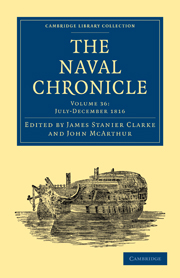 The Naval Chronicle
The Naval Chronicle Book contents
- Frontmatter
- PLATES IN VOLUME XXXVI. From Original Designs
- PREFACE TO THE THIRTY-SIXTH VOLUME
- ADDENDA TO THE BIOGRAPHICAL MEMOIR OF JOHN WESLEY WRIGHT, ESQ. CAPTAIN IN THE ROYAL NAVY
- ADDENDA TO THE BIOGRAPHICAL MEMOIR OF JOHN WESLEY WRIGHT, ESQ. CAPTAIN IN THE ROYAL NAVY
- ADDENDA TO THE BIOGRAPHICAL MEMOIR OF JOHN WESLEY WRIGHT, ESQ. CAPTAIN IN THE ROYAL NAVY
- ADDENDA TO THE BIOGRAPHICAL MEMOIR OF JOHN WESLEY WRIGHT, ESQ. CAPTAIN IN THE ROYAL NAVY
- BIOGRAPHICAL MEMOIR OF SIR DAVID MILNE, K.C.B. REAR-ADMIRAL OF THE BLUE SQUADRON
- BIOGRAPHICAL MEMOIR OF THE LATE ROBERT CAMPBELL, ESQ. CAPTAIN IN THE ROYAL NAVY
- INDEX
ADDENDA TO THE BIOGRAPHICAL MEMOIR OF JOHN WESLEY WRIGHT, ESQ. CAPTAIN IN THE ROYAL NAVY
Published online by Cambridge University Press: 10 January 2011
- Frontmatter
- PLATES IN VOLUME XXXVI. From Original Designs
- PREFACE TO THE THIRTY-SIXTH VOLUME
- ADDENDA TO THE BIOGRAPHICAL MEMOIR OF JOHN WESLEY WRIGHT, ESQ. CAPTAIN IN THE ROYAL NAVY
- ADDENDA TO THE BIOGRAPHICAL MEMOIR OF JOHN WESLEY WRIGHT, ESQ. CAPTAIN IN THE ROYAL NAVY
- ADDENDA TO THE BIOGRAPHICAL MEMOIR OF JOHN WESLEY WRIGHT, ESQ. CAPTAIN IN THE ROYAL NAVY
- ADDENDA TO THE BIOGRAPHICAL MEMOIR OF JOHN WESLEY WRIGHT, ESQ. CAPTAIN IN THE ROYAL NAVY
- BIOGRAPHICAL MEMOIR OF SIR DAVID MILNE, K.C.B. REAR-ADMIRAL OF THE BLUE SQUADRON
- BIOGRAPHICAL MEMOIR OF THE LATE ROBERT CAMPBELL, ESQ. CAPTAIN IN THE ROYAL NAVY
- INDEX
Summary
We come now to a document less argumentative than the preceding one, but by so much more to the purpose, as a statement of relative facts and circumstances is more illustrative than a course of abstract reasoning deductive of positive conclusions only from assumed premises.
To Admiral Sir Sidney Smith, from the Abbe Alary.
“Although in relating to you the sad and deplorable death of our common friend, my heart is wounded afresh, I shall proceed to acquit myself of this painful duty. I shall not remark or dwell upon that which is already known to you, I mean the personal hatred Napoleon bore him, after you had withdrawn together from revolutionary tyranny, by escaping from the Temple, and especially after you had dimmed his star, and effectually repulsed him at St. John d'Acre. He accused him of having landed people in France, with an intention to attempt his life. Thus prejudiced, he poured upon him the whole weight of that resentment which his rage suggested against the English government and people. Involved in the criminal process called “The grand Conspiracy;” interrogated by wicked and corrupt judges urged to effect his destruction; it would have been promptly and openly effected, if the satellites of the more infamous butcher had not feared that your government would have avenged the law of nations so cruelly outraged. His death was from that time determined on; but they still vacillated on the means to be adopted […].
- Type
- Chapter
- Information
- The Naval ChronicleContaining a General and Biographical History of the Royal Navy of the United Kingdom with a Variety of Original Papers on Nautical Subjects, pp. 265 - 352Publisher: Cambridge University PressPrint publication year: 2010First published in: 1816


